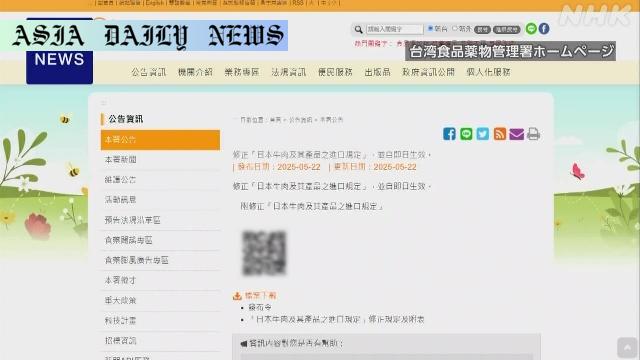Beef Imports: Taiwan lifts cattle age restriction on imports from Japan, sparking opportunities for Japanese beef producers and export markets.
- Taiwan removes the 30-month age restriction on Japanese beef cattle imports.
- The relaxation follows safety assurances since lifting the 2001 mad cow disease ban.
- Taiwan still mandates removal of specific parts like the brain and spinal cord.
- The policy change is anticipated to broaden the market for Japanese beef exporters.

Introduction to Taiwan’s Policy Change on Japanese Beef Imports
In a significant move to strengthen trade ties and expand markets, Taiwan has recently lifted a long-standing restriction on Japanese beef imports, which previously limited imports to cattle no more than 30 months old. This revision follows years of ensuring food safety and attempts to enhance bilateral trade with Japan. The latest decision is expected to provide a much-needed boost to Japanese beef exporters while offering Taiwanese consumers greater variety in their dietary choices.
Background: Historical Ban and Gradual Relaxation
The shift in policy marks a pivotal point in Taiwan’s approach to Japanese beef imports. The ban on Japanese beef imports initially came into effect in 2001 due to concerns over Bovine Spongiform Encephalopathy (BSE), commonly known as mad cow disease. The import restrictions were partially eased in 2017 after stringent measures and food safety standards in Japan were implemented and verified. At the time, Taiwan allowed beef imports from cattle aged 30 months or younger. This critical age limit reflected efforts to minimize any potential health risks associated with BSE while cautiously reintroducing Japanese beef.
Details of the Policy Update and Impact
The recent removal of the cattle age restriction signals a new chapter in trade relations between Taiwan and Japan. Despite the relaxation, Taiwan’s Food and Drug Administration (FDA) continues to mandate the removal of specific parts, such as the brain and spinal cord, as an added precaution against potential health risks. These measures aim to ensure that consumer safety remains a top priority. The decision to expand eligibility for beef imports to include older cattle is expected to widen Japan’s market share and enhance the competitive landscape of beef imports in Taiwan.
Economic Implications and Trade Opportunities
For Japan, Taiwan’s decision presents opportunities to export high-quality beef products to a broader audience. Japanese beef, often associated with premium quality and taste, could see increased demand as restrictions ease. In turn, Taiwan benefits by diversifying its food import market and catering to consumer preferences for premium international products. Additionally, such trade policies can foster stronger diplomatic and economic ties between the two neighboring nations. The decision reflects Taiwan’s confidence in Japan’s food safety standards, establishing a robust foundation for future collaborations in the food industry.
Consumer Interests and Market Dynamics
For Taiwanese consumers, the policy change brings exciting prospects. With the removal of cattle age restrictions, beef offerings in the local market could include a wider selection of premium cuts from Japan, enhancing dining experiences and creating opportunities for culinary innovation. Restaurants, retailers, and wholesalers are also poised to benefit from the influx of high-quality Japanese beef, which could command a significant presence in Taiwan’s food market. This mutual benefit to consumers and producers highlights the economic significance of the policy revision.
Conclusion
Overall, Taiwan’s decision to lift the age-based restriction on Japanese beef imports underscores its commitment to strengthening trade relationships while ensuring food safety. By balancing economic opportunities with consumer protection, the policy is likely to have a lasting positive impact. As Japan capitalizes on expanding its beef exports, Taiwanese consumers stand to enjoy greater variety and quality in their food choices, solidifying the benefits of this strategic trade decision.



Commentary
The Significance of Taiwan’s Trade Decision
Taiwan’s decision to remove cattle age restrictions on Japanese beef imports is a momentous step in fostering international trade relations. This choice reflects the Taiwanese government’s confidence in Japan’s rigorous food safety measures and highlights the importance of mutual trust between trading partners. It’s a pragmatic policy shift that underscores how global markets can adapt and evolve to meet changing demands and circumstances.
Balancing Safety with Economic Growth
One of the most notable aspects of this policy change is its dual focus on safety and economic progress. By continuing to mandate the removal of specific parts such as the brain and spinal cord, Taiwan has reassured its citizens about food safety while creating fresh opportunities for Japanese beef exporters. This balance is essential in maintaining public trust while promoting the benefits of open trade.
Consumer-Centric Policy Enhancements
The policy’s impact on Taiwanese consumers cannot be overstated. By removing restrictions that limited the availability of Japanese beef, Taiwan is not only broadening its local markets but also enhancing the quality and diversity of products available to its populace. This decision is likely to resonate positively with a public that values high-quality food products, ultimately strengthening the connection between trade policy and everyday consumer benefits.
Looking Forward
In conclusion, Taiwan’s decision to relax import restrictions on Japanese beef represents a forward-thinking approach to international trade and food policy. It is a move that underscores the potential for neighboring nations to collaborate in ways that are mutually beneficial. As this policy takes effect, it will be interesting to observe how the beef market in Taiwan evolves and how these changes influence broader trade dynamics across Asia.